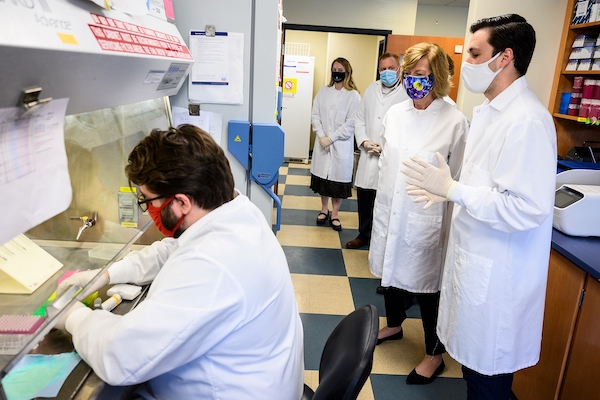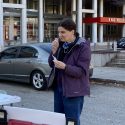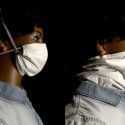Sen. Tammy Baldwin visits UW lab tracking COVID-19 variants

Sen. Tammy Baldwin listens to a presentation by UW–Madison graduate student Gage Moreno, far right, during a tour of the AIDS Vaccine Research Laboratory (AVRL) in University Research Park on April, 5. Photo: Jeff Miller
This week Sen. Tammy Baldwin visited a lab in Madison’s University Research Park where University of Wisconsin–Madison infectious disease experts have been cataloguing subtle genetic differences between hundreds of strains of the virus that causes COVID-19.
Genomic sequencing performed since March 2020 by a large group of scientists led by Thomas Friedrich and David O’Connor at the AIDS Vaccine Research Laboratory, have kept watch for the appearance in Southern Wisconsin of concerning viral variants and revealed important details about the spread of the virus in Wisconsin.
“We are lucky to have the infrastructure, built years ago by UW and federal resources, that allowed us to shift so quickly to studying an emerging pandemic,” Friedrich told Baldwin. “Sequencing has helped us understand the way COVID-19 has spread in Wisconsin and given us and our partners in state and local health departments the best information possible while they make decisions to help stop further spread.”
Baldwin introduced legislation in February to fund an expansion of virus genome sequencing, to make the kind of genomic surveillance the UW–Madison labs and partners around the state are providing to Wisconsin more common across the country. The bill’s plan was included in the American Rescue Plan passed by Congress and signed into law by President Joe Biden in March, providing $1.75 billion in new funding for genomic surveillance.
“We haven’t beaten this pandemic, especially when it comes to emerging variants and mutations of the coronavirus, which represent an ongoing threat to the health and security of our nation,” said Baldwin. “Tracking new variants is vitally important to our ability to combat this virus and get through the pandemic, and I want to applaud the team at the University of Wisconsin for their incredible work. The American Rescue Plan takes an important step in combatting these variants, and provides an investment for CDC to ramp up their efforts on genomic sequencing and surveillance nationwide.”
Graduate students, faculty, deans and Chancellor Rebecca Blank joined Baldwin for a tour of the lab on Monday, April 5. They discussed the importance of expanding sequencing now while also preparing for the next public health emergency by supporting the scientists and trainees who provide vital expertise, and ensuring the supplies and equipment necessary for labs can be available in short order.



